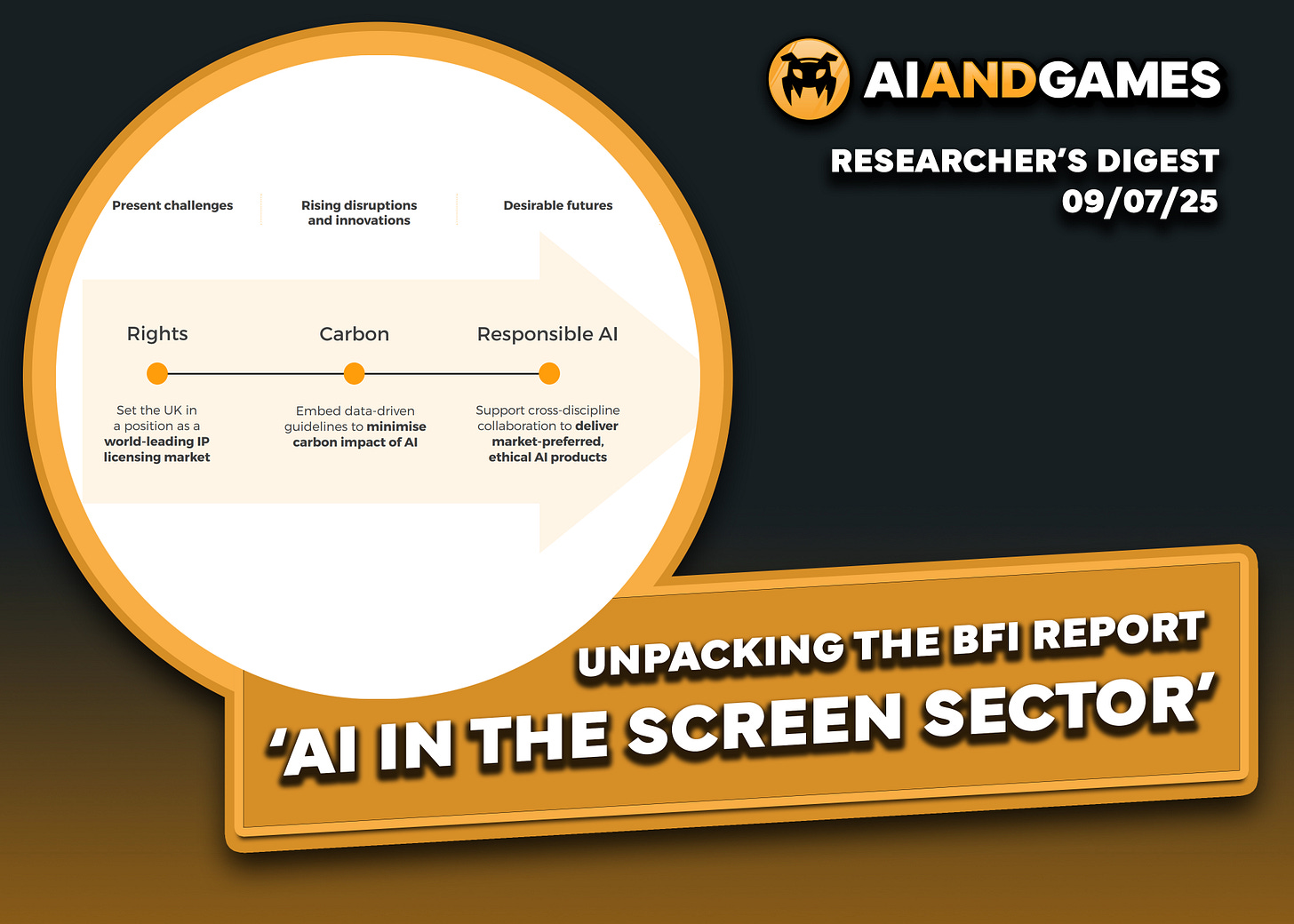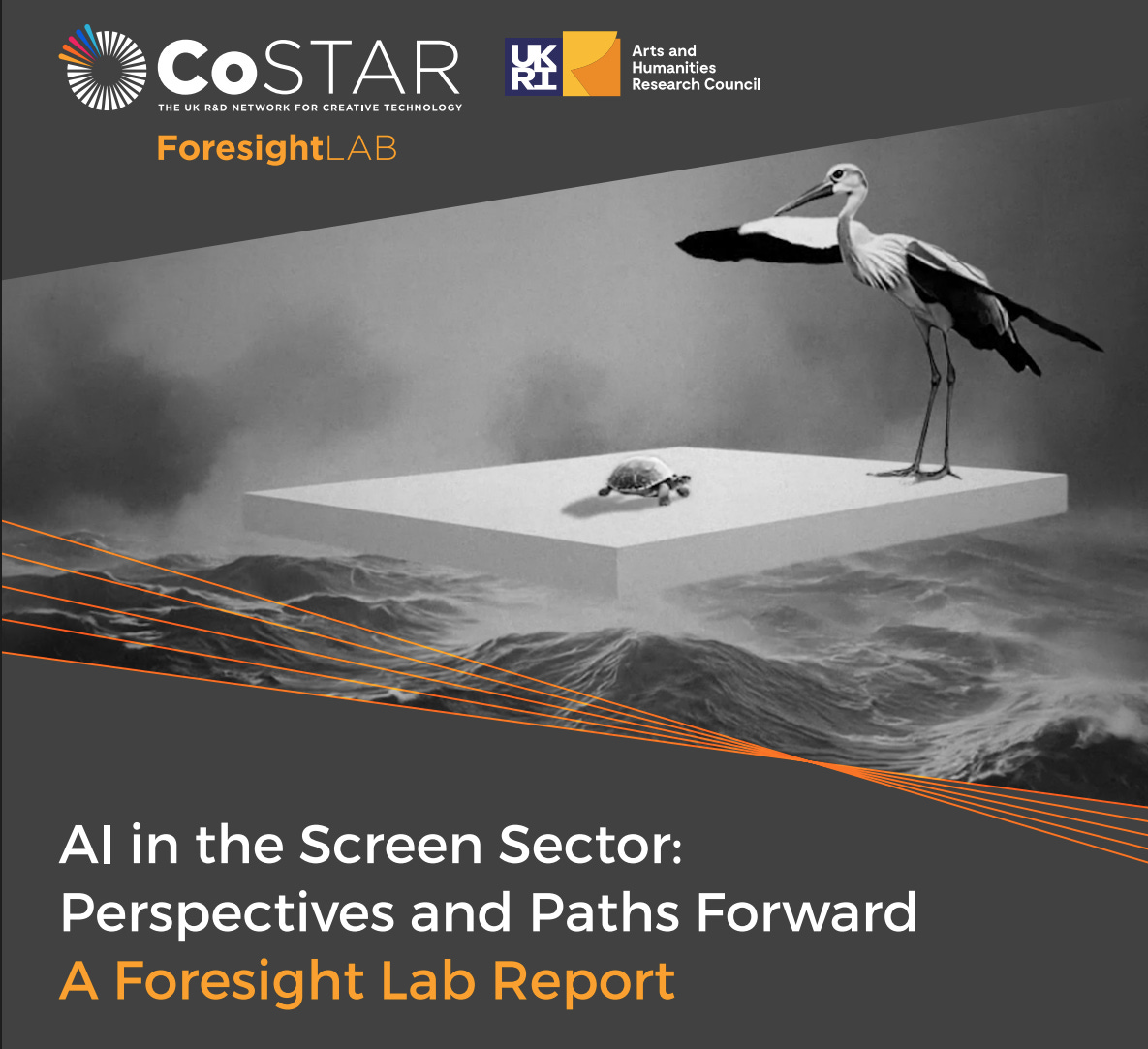Digging into the BFI's 'AI in the Screen Sector' Report
The first real UK analysis of AI in creative industries
Welcome to the AI and Games Digest. These specials editions of the newsletter are where we discuss topics in more detail outside the scope of our regular issues. In addition to our regular announcements and news stories, each issue digs into recent events, news, publications, games, and videos that intersect in part, or in full, with the AI and Games remit.
You can read part of each digest issue for free, and then catch the rest with a paid subscription to AI and Games.
Happy Wednesday, and welcome (back) to the AI and Games newsletter. As you’re reading this, I’m probably running around from one meeting to the next at Develop Conference in Brighton - the big games industry event of the UK calendar. So why don’t I take a break, pour myself a coffee, and chat with you for the next 20 minutes.
In this week’s issue our big focus for is a deep-die into the BFI’s recent publication on AI in the screen sector. We’re going to take a look at what their assessment of the situation - of AI within the UK’s creative industries - and their suggestions and actions for the future.
Plus of course, all the regular announcements, the news, and other jazz that we do right here every week. Let’s get started!
Follow AI and Games on: BlueSky | YouTube | LinkedIn | TikTok | Twitter | Threads
Announcements
Alrighty, another week, another whole bunch of exciting stuff is happening on AI and Games!
AI and Games Conference In Partnership with Women in Games
I’m pleased to announce that we are partnering with Women in Games as part of our 2025 event. Women in Games is a fantastic organisation that believes that getting more women into games and esports should be the norm, and in doing so leads to stronger teams, better insights, and innovative new products.
Our conference organisation Game AI Events CIC shares in these values. By bringing people together, and encouraging greater diversity and a broadening of perspectives, these actions are critical to sustaining and growing our field. As such, collaborating with Women in Games is a no-brainer!
Tommy is at Develop Right Now!
The first day at Develop was the longest day, but very much a rewarding one. Thank you to everyone who attended our mixer in collaboration with Mastered. It seems to have gone down pretty well. This is getting published right before I walk down to the VGIM breakfast session.
AI (and Games) in the News
There was only one story this week I wanted to get into, here it is!
Microsoft lays off 9000 employees, with AI a root cause?
This was of course the story that shook the industry last week, as Microsoft confirmed they were laying off as many as 9100 employees. This is the third round of layoffs in as many months, bringing the total up to around 15,000 since May. This comes after Microsoft’s CFO Amy Hood stated back in an earnings call in April that the company was focussed on ““building high-performing teams and increasing our agility by reducing layers [of management]”.
This has had a significant impact on the Xbox division. Most notably as games studio The Initiative, who were working on the (troubled) reboot of Perfect Dark has been shut down and the project cancelled. Meanwhile layoffs have killed long in development projects such as Everwild at Rare appears dead, and a new MMO being crafted at ZeniMax Online Studios (creators of Elder Scrolls Online). Word has gone out of further layoffs at Turn10 (Forza) and Blizzard (World of Warcraft, Overwatch). Meanwhile external studios who had publishing agreements with Microsoft are now feeling with the impact, as Romero Studios (founded by DOOM co-creator John Romero and his wife Brenda) have seen their funding pulled for an upcoming first person shooter, and the studio is now seeking a new funding partner after having let go numerous members of staff.
It has taken all of my energy to not tear up the newsletter plan, again, and focus solely on this issue. Not just because everywhere else is reporting on this, but it’s quite easy to draw a line between Microsoft’s repeated efforts to cut costs, and their cult-like race to embrace AI as their primary business model.
Mere months ago, Brad Smith - the vice chair and president of Microsoft - wrote a lengthy blog post that reeked of a political motion to cozy up to the incoming administration. But more critically, it stated their commitment to AI as follows:
”In FY 2025, Microsoft is on track to invest approximately $80 billion to build out AI-enabled datacenters to train AI models and deploy AI and cloud-based applications around the world. More than half of this total investment will be in the United States, reflecting our commitment to this country and our confidence in the American economy.”
For context: that’s a $25 billion increase from the 2024FY.
At a time when professionals in the games industry are already hurting from the impact of these unregulated technologies, once can quite easily suggest that they’re now losing their jobs to pay for it.
As I said, it’s taken a lot of energy not to focus this issue on this topic. Not just because of the impact of it, not just because of the potential of AI being the root cause, but because I am very angry at this implication - and I don’t think it’s wise for me to write about it at length at this time!
The BFI’s ‘AI in the Screen Sector’ Report
For this week, I wanted to spend my time digging into the report from the British Film Institute (BFI) on AI in the creative industries. What does the report say, particularly in the context of the games industry, and share some of my perspectives and how my views align with it.
A High-Level Summary
This paper is, to the best of the authors knowledge - and mine - the first significant effort to document the current state of adoption of generative AI in the UK’s ‘screen sector’ (i.e. film, television, and video games). It gives a breakdown of the current landscape, including how generative AI is currently adopted in the UK’s creative industries, and the potential impacts - both positive and negative - in its continued influence on the sector.
It reflects that which we discuss here on the newsletter in that the creative industries - and in our case games - are one of the leading sectors on AI adoption in general, and this comes at a time when platform holders for generative AI systems are moving to build systems that directly intersect with the work that takes place in this industry. While the narratives suggest that the UK is falling behind in the spce of AI developments in creative industries, the research by the authors suggests that much of what is seen publicly is but the tip of the iceberg. Not just in terms of professional adoption and experimentation, but also research and development of relevant technologies.
However much of this innovation comes at a time when controversy dominates the discussion. As the usage of copyrighted materials has led to a unified front across many creative sectors in demanding stronger legislation and copyright protections in the UK (a point we have discussed at great length this year in the newsletter). Not to mention a broader conversation about job displacement, a deficit of training and skills, but also the potential impacts of AI on climate change and a homogenisation of culture if outputs are being churned out of generative AI systems.
The report then concludes with a series of nine recommendations on how the screen sectors should be approaching the issues. These recommendations fall under three strategic outcomes:
Developing collaborative frameworks to support innovation
Creating a licensing market for UK intellectual property.
Minimising carbon impact of generative AI usage.
Building an approach for responsible AI deployment.
More targeted support for specific areas of the screen sectors.
Building leading strategies on safe and practical adoption.
Developing skills in the sector to support creatives.
Drive increased public understanding of AI in screen sectors.
Identified barriers to growth need to be eliminated.
Boosting the UK’s digital content production
Investing in the UK’s creative technology sector.
Empowering UK creatives in AI-supported creativity
What’s the Paper, and Where Can I Find It?
All the critical information you need is right here:
Title: AI in the Screen Sector: Perspectives and Paths Forward
Authors: Angus Finney, Brian Tarran and Rishi Coupland
Delivered in partnership with the CoSTAR Foresight Lab, an academic research lab led by Goldsmith’s University in London (where we run our conference), alongside the likes of Loughborough University and the University of Edinburgh (one of my alma maters).
Date Published: June 2025
DOI: https://doi.org/10.5281/zenodo.15601301
For those unfamiliar, a DOI (Digital Object Identifier) is a standard for maintaining digital identifiers for documents and other artefacts such as research papers. The link above will always point to the active location of this paper on the internet.









